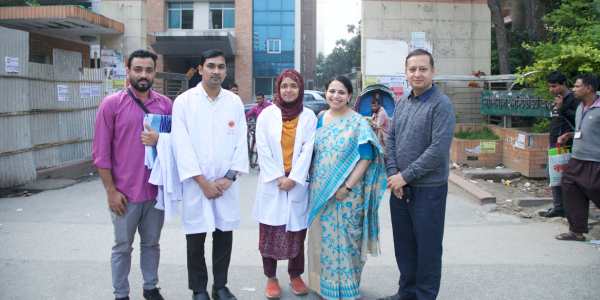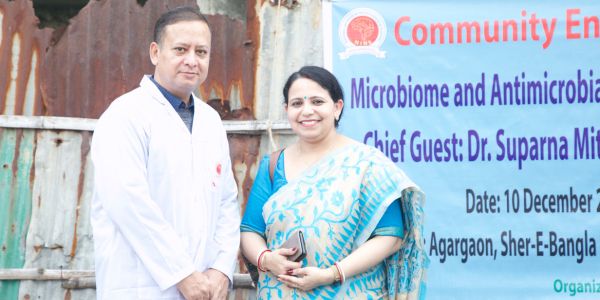Research project
Impact of unrestricted antimicrobial usage on the gut microbiome and antibiotic resistance genes (ARGs) among Bangladeshi population in LMIC context #DhakaGutAMR
- Start date: 26 July 2023
- End date: On-going
- Partners and collaborators: National Institute of Neuro Sciences & Hospital, Dhaka, Bangladesh https://www.nins.gov.bd/nins/
- Primary investigator: Dr Suparna Mitra
- External co-investigators: Dr. Md. Abdullah Yusuf (Co-I), Molecular Biologists, National Institute of Neurosciences & Hospital, Dhaka, Bangladesh, Prof. Md Firoz Ahmed (Co-I), Environmental Microbiologist, Jahangirnagar University, Bangladesh, Prof. Rumana Rois (Co-I), Statistician, Jahangirnagar University, Bangladesh

Description
The human body is home to several millions microbes which is called microorganisms all together . Some microbes make us sick, others are important for our health. The most common types are bacteria, viruses and fungi. They can be both helpful and potentially harmful. Most are symbiotic (where both the human body and microbiota benefit) and some, in smaller numbers, are pathogenic (promoting disease). In a healthy body, pathogenic and symbiotic microbiota coexist without problems. We want our body in a equilibrium. And nurture our good warriors with good food and healthy lifestyle. But often with unhealthy diet, and bad lifestyle, and unrestricted use of antimicrobials we ruin our healthy gut flora.
My work is focus on this How we can study and understand our microbiome within our body and in the environment. How we can restrict the use of antimicrobials and save the life saving drugs for future generations. I want to be part of a shared platform for tackling global AMR challenge by connecting interdisciplinary research communities and addressing recent demands in medical science combining methodologies for data analyses with advanced sequencing techniques.
With a focus on microbiome research and combating antimicrobial resistance in LMICs, my journey was strengthened by the Michael Beverley Innovation Fellowship (MBIF) in 2022, pivotal for my work in Bangladesh.
After meticulous groundwork and securing partnerships, including ethical approvals and university diligence, our collaboration with the National Institute of Neurosciences Hospital (NINH), Dhaka, commenced after a 10-month process. Our initial focus in Sher-E-Bangla-Nagar, Dhaka, involved engaging doctors and the public to gauge volunteer capacity and explore the impact of unrestricted antimicrobial usage on gut microbiomes and antibiotic resistance genes (ARGs) among healthy volunteers.
Backed by the International Strategic Fund (ISF), our community engagement event in Dec’23 shed light on the extensive challenges posed by unrestricted antimicrobial usage across human, animal, and environmental spheres. The Trinity AMR call further aligned with our research needs, fortifying our resolve to address this pressing issue.
Progress has been promising, with a robust multidisciplinary team in place, including professionals from various fields. We have achieved our target recruitment of 75 volunteers and completed DNA extraction which is due to ship in UK (March’23) for further sequencing and data analyses.
As we move forward, our strategy aims to enhance our understanding of the impact of antimicrobials. This expansion involves not only direct human consumption but also employs a One Health approach across various geographical locations, including urban, peri-urban, and rural areas. This comprehensive approach considers human accessibility and investigates the exposure of antibiotics to a wide range of food sources such as fish, chicken, cow, and goat, as well as environmental factors.

Impact
Our project caters to health protection organisations, offering vital insights into AMR spread and microbiome diversity for strategic interventions. Early engagement with policymakers ensures our findings directly influence impactful measures, safeguarding public health.
We also foster grassroots community awareness through education, advocating for traditional diet benefits and prudent antimicrobial use. Promoting pro and pre-biotic values of traditional remedies for simple illnesses can help avoid unnecessary antimicrobial usage. By disseminating comprehensive research, we champion a holistic approach, influencing policies for a resilient and healthier future.

